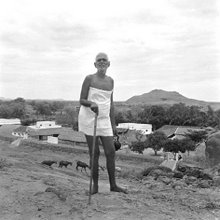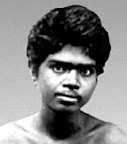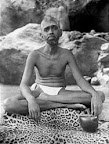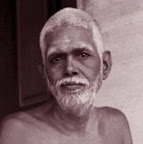"THERE is no time to waste. I must reach the lap of Arunagireeswara. How to do so? Won't He show the way?", thought Venkataraman and got up at once.
His brother asked him where he was off to. "I have a special class on Electricity at twelve. I have to attend it," replied Venkataraman. The brother said, "Very well, there are five rupees in the box downstairs. Take the keys from aunt and pay my college fees. After all, the college is close to your school." The brother was not at all aware that he was facilitating the journey of Venkataraman who must have thought that his Father was coming to his help. It also confirmed his feeling that his departure was at the command of his Father.
Venkataraman went down, hurriedly ate the meal served by his aunt and took the amount as directed by his brother.
How was he to know the way? He did not feel like asking anyone nor could anyone have guessed his plan. Years later, Bhagavan's class fellow Ranga Iyer had his darshan, prostrated before him and asked, "How is it that you did not even tell me that you were leaving home?" The reply was, "I myself did not know till I actually left the house." He consulted an old atlas and noticed that Tindivanam on the Villupuram-Madras railway section was the nearest railhead to Arunachala. Actually, Tiruvannamalai station was on the Villupuram-Katpadi railway section laid about four years earlier — but it was not shown in the atlas. The fare for Tindivanam was three rupees. He took that amount and replaced two rupees in the box. He wrote a brief note addressed to his brother and placed it prominently in the box and embarked on his journey. This was what he wrote:
"I have, in search of my Father and in obedience to his command, started from here. This is only embarking on a virtuous enterprise. Therefore none need grieve over this affair. To trace this, no money need be spent.
Thus - - - - - - - -
P.S. Your college fee has not been paid. Two rupees are enclosed."
This letter, some say is evidence of the steadily increasing Self knowledge. But was it so? The `I' at the commencement is no indication of Venkataraman's identification with the body. To say so is to belittle his realization of the distinction between the body and Self, already acquired. His not signing the letter was not due to the absence of any individual doer. After all, he was in any case writing the letter. He was immersed in the formless entity. Therefore, it does not appear correct to assume that he had no consciousness of Venkataraman the individual. In the phrase "your .. fee" the distinction between `me' and `you' is obvious enough. The only things that are clear from the letter are Venkataraman's knowledge of the Self as distinct from the body, actions taking place without any particular intention, and his anxiety to see that his relations were not inconvenienced on his account, a noble trait in itself!
Had the train arrived at the scheduled time of 12 noon at the station that day, Venkataraman would have missed it. It came one hour late, which was why, though he took time in walking the distance from home he did not miss the train.
Venkataraman thought that it was further proof of God himself attracting him like a magnet and resolving all inconvenient situations on the way. He bought a ticket to Tindivanam paying a little less than three rupees.1 Had he seen the fare table a little below he would have noticed the Villupuram-Katpadi line and Tiruvannamalai station thereon. His mind was centred entirely on Arunachala and so he could not notice anything other than his goal. He did not want to ask anyone else as that could be a give-away. He was in a state of excitement and had no interest in any contact with others. He got into the train on its arrival and sat quietly, not speaking to anyone. The train sped on — he did not turn to look back at the beautiful city of Madurai nor at all those dear places where he had played since childhood.
Venkataraman sat, eyes closed, oblivious of his physical body or was it that his body was flying in the "inward sky?"
Along the banks of the South flowing Vaigai were green fields, coconut and mango groves all presenting a picture of Nature's bounty. Wasn't this beautiful earth a manifestation of Easwara? A little later came the Dindigul fort where Venkataraman played about in his younger days — there was only one game left for Venkataraman thereafter. This was to dwell in the ocean of blissful nectar! Such was Venkataraman's state; how could he look at Nature's beauty or his favourite haunts of bygone days?
1India did not have decimal coinage during those days. The amount paid by Venkataraman was Rs. 2-13-0 or about Rs. 2.80. He had about 20 paise left.
Referred Resources:
Links to letters:
childhood: (Chapter 259: Boyhood Days
Links to rl:
Villupuram: (Chapter 10: The Great Journey
Links to sp:
Links to gems:





No comments:
Post a Comment